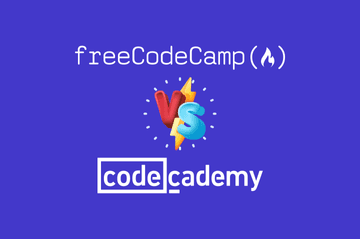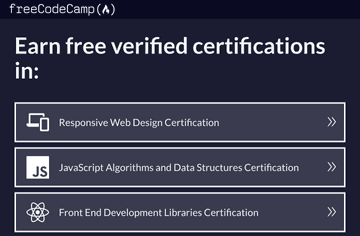
FreeCodeCamp vs Codecademy: Which is Better?
Embarking on a coding journey? Wondering which online learning platform to choose?
Look no further! In this article, we'll compare FreeCodeCamp vs. Codecademy, two popular platforms for coding education. Whether you're a beginner or looking to level up your skills, we'll dive into their curriculum, learning experiences, community support, pricing, and more.
Discover the differences, pros, and cons as we help you make an informed decision.
Let's dive in.
Comparison Overview: freeCodeCamp vs Codecademy
The table below highlights each platform's key features and aspects, giving you a glimpse into what they offer regarding curriculum, learning experience, community support, pricing, and more. Use this handy reference to get a clear picture of the similarities and differences between Freecodecamp and Codecademy, helping you make an informed choice for your coding journey.
| Features | freeCodeCamp | Codecademy |
|---|---|---|
| Curriculum |
|
|
| Learning Format |
|
|
| Community Support | Active community-driven forum | Forums and community discussion boards with frequent physical and virtual meetups |
| Ideal For | Same (Beginner to advanced learners) | Same (Beginner to advanced learners) |
| Mobile Accessibility | Limited mobile support | Mobile apps available (Android & iOS) for learning on the go |
| Average Ratings |
Background: freeCodeCamp vs. Codecademy
What is freeCodeCamp?

Founded in 2014 by Quincy Larson, freeCodeCamp is a donor-supported nonprofit organization that aims to help people transition into tech careers using free online resources.
It includes an excellent online learning platform, chat rooms, medium publications, and other stakeholders who help make learning accessible and free to everyone.
Simply said, it’s a free repository of online programming tutorials and lessons. freeCodeCamp makes all this possible through well-written articles, video tutorials, lessons, and study forums.
Pros
- Free to use
- Vibrant and supportive online community
- Tutors regularly update their courses
- You receive certifications for courses undertaken (However, you should note that freeCodeCamp isn’t an accredited program)
Cons
- No mobile app(s) available
- Some learning materials aren’t in-depth
- Certificate not recognized by employers (program not accredited)
What is Codecademy?

What strikes you at first when you visit the Codecademy website is its bold mission: “to create a world where anyone can build something meaningful with technology with access to the right tools and resources.”
It’s easy to see why this is so; they have a bold mission to rethink digital education from the ground up. And they’re already succeeding at this, as over 50M learners have enrolled in Codecademy courses. This is thanks in part to their massive focus on accessibility and engagement.
As an online interactive platform, Codecademy provides free coding classes in 12 programming languages and other subject areas such as cyber security.
Pros
- In-built online code editor (you don’t need to use external tools)
- Tutorials are concise
- Interactive learning through hands-on projects
- Courses are self-paced, which means you own your learning; no deadlines or pressure from instructors.
- YouTube video lessons
Cons
- Not accredited. Certificates offered only proof that you have completed a course
- Some features and courses are locked behind a paywall
- It lacks live lectures or office hours, which may benefit beginners who want someone to explain things in person.
Curriculum and Course Offerings
When comparing freeCodeCamp and Codecademy, examining their curriculum and course offerings is essential to determine which platform aligns best with your learning goals. Both platforms cover a wide range of programming languages and technologies, ensuring there's something for everyone.
freeCodeCamp boasts a comprehensive curriculum that includes:
- Front-end development
- Back-end development
- Data visualization
- Data analysis
- Quality assurance (QA)
- Visual design
- Accessibility
- Information security
- Coding interview preparation
- Data Structures and Algorithms
- Object-oriented programming
- Debugging
Their learning path is structured into certifications, guiding you through hands-on projects to build practical skills. Additionally, freeCodeCamp offers specialized tracks, such as machine learning and data science, for those looking to explore advanced topics.
As a substitute, Codecademy provides various courses that cater to different interests and skill levels. From introductory web development courses to advanced topics like:
- Cyber security
- Machine learning
- APIs and frameworks
- Data Science
Overall, it’s easy to say Codecademy offers an in-depth learning experience. But besides the courses, they have dedicated career paths focusing on specific areas such as:
- Full-stack engineer
- Back-end engineer
- iOS Developer
- Front-end engineer
- Computer science
- Data scientist
The above paths allow you to dive deeper into specialized subjects depending on your career goals.
Both platforms emphasize interactive learning, but their approaches differ slightly. freeCodeCamp offers a hands-on coding experience through its browser-based coding challenges and projects. Codecademy provides interactive lessons that combine explanations, coding exercises, and quizzes to reinforce learning.
Ultimately, the choice between freeCodeCamp and Codecademy depends on your preferences and learning style. FreeCodeCamp's structured curriculum and project-based approach may suit individuals seeking a guided path, while Codecademy's extensive course library provides flexibility to explore specific topics of interest.
That said, take the time to evaluate your learning objectives and dive into the curriculum details of each platform to make an informed decision.
Success Stories and Community Support
freeCodeCamp boasts an active and supportive community of learners and developers. Many success stories showcase individuals who have gained valuable coding skills through the platform and successfully transitioned into fulfilling careers.
In her Medium blog, Vered Rekanati shares how she went from being a 33-year-old museum tour guide to a professional Web Developer and UX Designer by leveraging freeCodeCamp’s resources. You can also read more success stories on the freeCodeCamp subreddit.
freeCodeCamp's collaborative forums and chat rooms allow learners to engage with peers, ask questions, and receive guidance, creating a strong sense of community.
Similarly, Codecademy has a vibrant community with success stories highlighting learners' achievements. Their forums and community discussion boards allow learners to interact, seek assistance, and share their progress. Watch how Harriet went from quitting a job she didn’t like to become a front-end developer.
Here are more learner stories from Codecademy to inspire your journey into tech.
Besides the active community platforms, the availability of mentorship programs and networking opportunities also enhances the support system.
Engaging with these communities can provide valuable networking opportunities, peer support, and a sense of motivation throughout your learning journey. Interacting with like-minded individuals who share your passion for coding can help foster growth and provide valuable connections within the industry.
Pricing and Accessibility
freeCodeCamp follows a donation-based model, offering its curriculum and resources for free. This makes it accessible to anyone with an internet connection. They rely on donations to sustain their operations and ensure their resources remain freely available to all learners.
Codecademy, on the other hand, provides both free and paid subscription plans. The subscription plan has two tiers:
- Plus plan: $13.99/month (billed annually) or $17.49 (billed monthly)
- Pro Plan: $23.99/month (billed annually) or $29.99 (billed monthly)
Their free plan (called Basic) grants access to a limited selection of courses, while their paid subscription offers additional features, such as unlimited course access and exclusive content.
You may need to evaluate your budget and the value you seek from a platform to determine which pricing model aligns with your needs. Both platforms strive to make coding education accessible, so consider your financial situation and the resources each platform offers within your means.
FAQs
Is freeCodeCamp or Codecademy better for beginners in coding?
Both freeCodeCamp and Codecademy offer beginner-friendly learning experiences. freeCodeCamp provides a community-driven approach with a wide range of curricula, while Codecademy offers interactive tutorials and challenges. It ultimately depends on your learning style and preferences.
Do employers recognize the course certificates from freeCodeCamp and Codecademy?
While the recognition may vary, these certificates can demonstrate your dedication to learning, and some employers in the coding field may value them.
Can I switch between freeCodeCamp and Codecademy courses?
Yes. You can switch between freeCodeCamp and Codecademy courses based on your learning needs and preferences. Both platforms offer various courses, allowing you to explore different topics and programming languages.
Do freeCodeCamp and Codecademy offer support for advanced topics or specialized programming languages?
Yes. Both platforms offer advanced courses and specialized programming language tracks to cater to learners with more experience. You can delve into specific topics and deepen your knowledge in areas that interest you on either platform.
Conclusion
Choosing between freeCodeCamp and Codecademy depends on your learning preferences, goals, and budget.
freeCodeCamp offers a structured curriculum, hands-on projects, and a supportive community, all for free. Codecademy provides various courses, great career paths, and interactive learning experiences with free and paid subscription plans.
When deciding which platform to learn with, consider your:
- Desired curriculum
- Learning style
- Community engagement
- Financial situation
Whichever platform you go for, both platforms excel at offering valuable resources to help you kickstart an exciting tech career.
All the best!